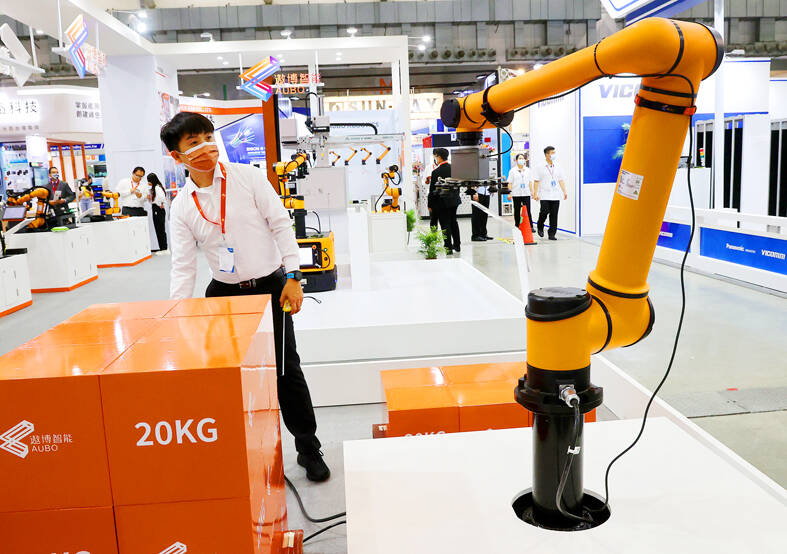Business confidence last month picked up among domestic manufacturers and service providers, but the construction and property sectors turned gloomy ahead of the expected enactment of unfavorable legislation, the Taiwan Institute of Economic Research (TIER, 台灣經濟研究院) said yesterday.
The sentiment reading gained a fractional 0.87 points among local manufacturing sectors, reversing 10 months of a downturn, as most firms are neutral or slightly more optimistic about business prospects, TIER president Chang Chien-yi (張建一) said.
Inventory adjustments could come to an end in the next six months, but it remains to be seen if demand would be replenished afterward, Chang said, adding that end-market demand remains sluggish amid sharp inflation and monetary tightening.

Photo: CNA
The business outlook appears brighter among ASEAN and Indian markets, while it is recouping in China after Beijing eased its COVID-19 controls, TIER said.
The number of manufacturers with negative views about business prospects decreased 4.5 percentage points to 33.9 percent, while companies with positive views gained 7.2 percentage points to 20.9 percent, the institute’s monthly survey found.
Chemical product suppliers have divergent perspectives, with about 50 percent looking at improvement and 40 percent predicting further deterioration, it said, adding that base metal manufacturers are more optimistic.
A majority of electronics and machinery suppliers remained downbeat, but the degree of pessimism subsided somewhat, the institute said.
The global economy could start to recover after hitting a low at some point next year, TIER economist Gordon Sun (孫明德) said.
A breakthrough in the Ukraine war could take place, speeding up the recovery, Sun said.
The sentiment measure among local service providers rose 0.31 points to 91.21, terminating three months of decline, TIER said.
Securities houses, department stores and restaurants reported an increase in sales, thanks to a rebound in the TAIEX, anniversary sales and loosened COVID-19 restrictions, the survey said.
In contrast, shipping and logistics service providers took a hard hit, as recession fears weighed on demand, it said.
The confidence reading dropped 0.24 points to 85.6 among the construction and property sectors, softening for four consecutive months, it said.
The sentiment retreat is related to the ban on transfers of presale house contracts that could clear the legislature after winning approval from the Ministry of the Interior last week, TIER said.
Interest rate hikes have dampened buying interest, which is why housing transactions last month tumbled nearly 30 percent from a year earlier, it said.

TRADE WAR: Tariffs should also apply to any goods that pass through the new Beijing-funded port in Chancay, Peru, an adviser to US president-elect Donald Trump said A veteran adviser to US president-elect Donald Trump is proposing that the 60 percent tariffs that Trump vowed to impose on Chinese goods also apply to goods from any country that pass through a new port that Beijing has built in Peru. The duties should apply to goods from China or countries in South America that pass through the new deep-water port Chancay, a town 60km north of Lima, said Mauricio Claver-Carone, an adviser to the Trump transition team who served as senior director for the western hemisphere on the White House National Security Council in his first administration. “Any product going

High above the sparkling surface of the Athens coastline, the cranes for building the 50-floor luxury tower centerpiece of Greece’s future “smart city” look out over the Saronic Gulf. At their feet, construction machinery stirs up dust. Its backers say the 8 billion euro (US$8.43 billion) project financed by private funds is a symbol of Greece’s renaissance after the years of financial stagnation that saw investors flee the country. However, critics see it more as a future “ghetto for the rich.” It is hard to imagine that 10km from the Acropolis, a new city “three times the size of Monaco”

STRUGGLING BUSINESS: South Korea’s biggest company and semiconductor manufacturer’s buyback fuels concerns that it could be missing out on the AI boom Samsung Electronics Co plans to buy back about 10 trillion won (US$7.2 billion) of its own stock over the next year, putting in motion one of the larger shareholder return programs in its history. South Korea’s biggest company would repurchase the stock in stages over the coming 12 months, it said in a regulatory filing on Friday. As a first step, it would buy back about 3 trillion won of paper starting today up until February next year, all of which it would cancel. The board would deliberate on how best to effect the remaining 7 trillion won of buybacks. The move

In a red box factory that stands out among the drab hills of the West Bank, Chat Cola’s employees race to quench Palestinians’ thirst for local products since the Gaza war erupted last year. With packaging reminiscent of Coca-Cola’s iconic red and white aluminum cans, Chat Cola has tapped into Palestinians’ desire to shun brands perceived as too supportive of Israel. “The demand for [Chat Cola] increased since the war began because of the boycott,” owner Fahed Arar said at the factory in the occupied West Bank town of Salfit. Julien, a restaurateur in the city of Ramallah further south,